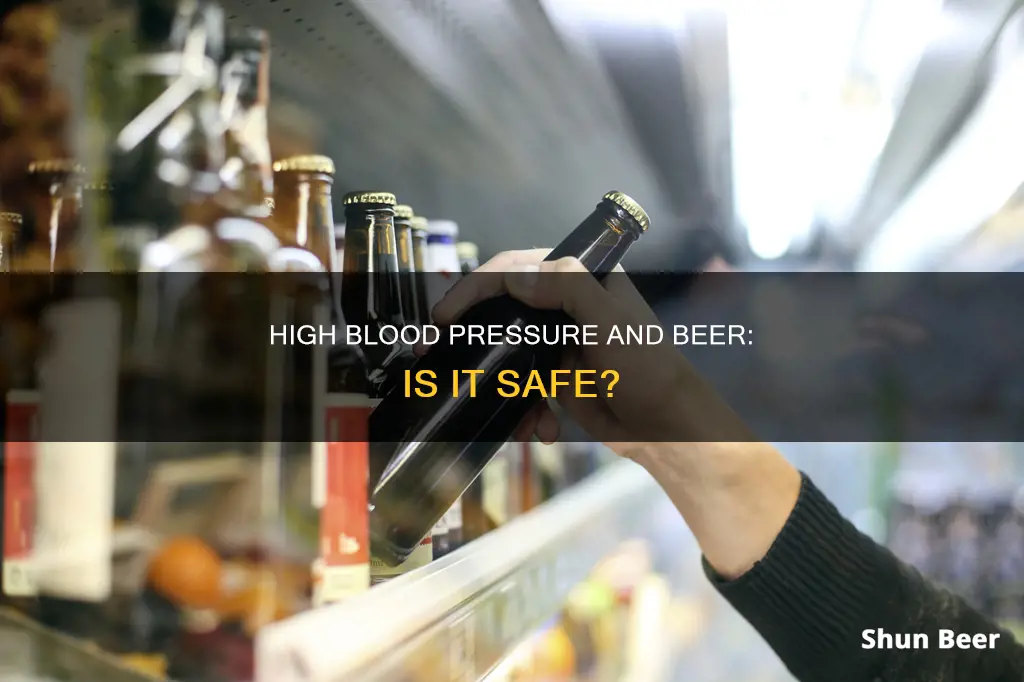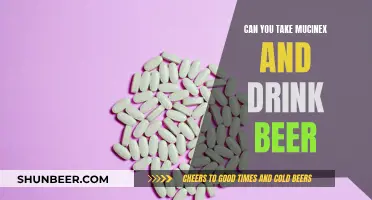
Alcohol can increase blood pressure. Drinking too much alcohol can raise your blood pressure. The more alcohol you drink, the higher the risk of developing hypertension. If you have high blood pressure, it's probably in your best interest to drink minimally. Experts suggest that people with high blood pressure shouldn't exceed moderate alcohol consumption, which is one drink or less per day for women and two drinks or less per day for men.
| Characteristics | Values |
|---|---|
| Can I drink beer with high blood pressure? | It is not recommended to drink beer or any alcoholic beverage if you have high blood pressure. |
| How does alcohol affect blood pressure? | Alcohol can cause a temporary spike or drop in blood pressure, but overall, it increases blood pressure. |
| How much alcohol can I drink if I have high blood pressure? | It is recommended to limit alcohol consumption to no more than 1 drink per day for women and 2 drinks per day for men. |
| What are the risks of drinking alcohol with high blood pressure? | Drinking alcohol with high blood pressure can lead to serious health issues such as heart disease, stroke, and other cardiovascular problems. It can also interact with high blood pressure medications. |
| How can I lower my blood pressure? | Ways to lower blood pressure include losing weight, cutting sodium intake, reducing stress, and limiting alcohol consumption. |
What You'll Learn

How does alcohol affect blood pressure?
Drinking alcohol can have a significant impact on blood pressure. While some studies suggest that light-to-moderate drinking may have a subtle positive effect on blood pressure, the overall evidence indicates that alcohol consumption, especially in high amounts and over the long term, leads to an increased risk of high blood pressure and related cardiovascular issues.
The Link Between Alcohol and High Blood Pressure
The amount and frequency of alcohol consumption are crucial factors in understanding its effect on blood pressure. Binge drinking, defined as consuming five or more drinks for men and four or more drinks for women within two hours, can cause a temporary spike in blood pressure. On the other hand, low doses of alcohol (one drink) have been shown to have no short-term impact on blood pressure.
However, the overall long-term effect of regular drinking is a gradual increase in blood pressure. This is due to alcohol's impact on various body systems and hormones, including the nervous system, kidneys, and blood vessels. Alcohol consumption leads to the release of fight-or-flight hormones like adrenaline, which raises blood pressure and heart rate. It also causes an increase in calcium levels, resulting in the narrowing of blood vessels and a subsequent rise in blood pressure.
Alcohol's Interaction with High Blood Pressure Medications
It is important to note that alcohol can interact with high blood pressure medications. Combining alcohol with certain blood pressure medications can lead to side effects such as dizziness, fainting, and irregular heartbeat. Therefore, it is crucial to consult with a healthcare provider to understand the potential risks associated with alcohol consumption while taking these medications.
Lowering Blood Pressure through Lifestyle Changes
To effectively manage high blood pressure, it is recommended to focus on lifestyle modifications. This includes losing weight through diet and exercise, reducing sodium intake, managing stress, and limiting alcohol consumption. By making these changes, individuals can significantly improve their blood pressure readings and overall health.
Beer and Cholesterol: Drinking Before a Test
You may want to see also

What are the risks of drinking with high blood pressure?
Drinking alcohol can have detrimental effects on your health if you have high blood pressure. Alcohol can interact with high blood pressure medications and cause dizziness, fainting, and irregular heartbeat.
Research shows that drinking alcohol in moderation can make for a healthier heart. Light-moderate drinking (up to two drinks a day for men and one for women) has been shown to cause a subtle drop in blood pressure in some cases. In small amounts, it has been shown to lower blood pressure by 2 to 4 mm Hg in women. However, most experts agree that this is not a significant enough drop to recommend drinking for the general population.
Drinking more than one or two drinks in a sitting has been directly linked to a rapid rise in blood pressure, which in someone with very high levels of hypertension can lead to a stroke. Binge drinking, defined as having 5 or more drinks for men and 4 or more drinks for women in a span of 2 hours, can cause a temporary spike in blood pressure.
The overall long-term effect of regular drinking is for blood pressure to gradually increase. This is because of alcohol's effects on several different parts of the body, including the nervous system, kidneys, and blood vessels. Alcohol increases oxidative stress, which is likely a key contributor to the development of alcohol cardiomyopathy. People with alcohol-related cardiomyopathy have diastolic or systolic dysfunction and sometimes also have symptoms of heart failure.
If you have high blood pressure, your healthcare professional may ask you to cut back on drinking.
Beer Expiration: Safe to Drink After Expiry?
You may want to see also

Is red wine good for high blood pressure?
Red wine has long been associated with improved heart health. However, the verdict is still out on whether it is beneficial for those with high blood pressure. While some studies suggest that moderate consumption may offer a slight drop in blood pressure, the effect is not significant enough to recommend drinking for this purpose. Additionally, excessive alcohol consumption can lead to a host of health issues, including high blood pressure.
The Link Between Red Wine and Heart Health
For years, studies have suggested a link between drinking a moderate amount of red wine and positive heart health. Red wine contains antioxidants such as resveratrol, which is also found in peanuts and blueberries. Some studies suggest that resveratrol can reduce cholesterol and lower blood pressure. However, there is ongoing debate about whether resveratrol is truly cardioprotective and, if so, how much is needed to have a beneficial effect.
The Impact of Alcohol on Blood Pressure
It is important to note that excessive alcohol consumption is a known risk factor for high blood pressure. Drinking too much alcohol can raise your blood pressure, and individuals with hypertension may be advised by their healthcare providers to cut back on drinking. While light to moderate drinking (up to two drinks a day for men and one for women) has been associated with a subtle drop in blood pressure in some cases, the effect is not significant enough to recommend drinking as a means of lowering blood pressure.
Non-Alcoholic Red Wine: A Potential Alternative?
Recent studies have suggested that non-alcoholic red wine may be more effective at lowering blood pressure than its alcoholic counterpart. A team of Spanish researchers found that drinking non-alcoholic red wine led to a reduction in systolic blood pressure in men with cardiovascular risk factors. The study also showed an increase in plasma nitric oxide levels, which helps improve blood flow. These findings suggest that the alcohol in wine may interfere with the beneficial effects of antioxidants. However, more research is needed to confirm these results.
Lifestyle Factors and High Blood Pressure
It is essential to consider that the link between red wine and improved heart health may be influenced by other lifestyle factors. These could include a healthier diet, such as the Mediterranean diet, which is known to be cardioprotective. Additionally, factors such as weight, diet, exercise, and stress levels play a significant role in managing high blood pressure. Losing weight, reducing sodium intake, exercising regularly, and managing stress are recommended strategies for lowering blood pressure.
In conclusion, while red wine has been associated with potential heart health benefits, the evidence for its impact on high blood pressure is inconclusive. The decision to consume red wine should be based on an individual's overall health profile and made in consultation with a healthcare professional.
Beer and Bone Grafts: What You Need to Know
You may want to see also

How much alcohol is safe for people with high blood pressure?
Drinking alcohol can have both positive and negative effects on health. While some studies suggest that light-to-moderate drinking may lead to a slight drop in blood pressure, the World Health Organization (WHO) and other experts emphasize that there is no safe amount of alcohol consumption when it comes to health. Alcohol is a toxic and dependence-producing substance, classified as a Group 1 carcinogen, and has been linked to various types of cancer, including common ones such as bowel and breast cancer.
The amount of alcohol considered safe or harmful can vary depending on individual factors such as age, gender, weight, and health conditions. Here are some general guidelines and recommendations regarding alcohol consumption for people with high blood pressure:
- The American Heart Association recommends no more than two drinks per day for men and one drink per day for women.
- The U.S. Dietary Guidelines suggest that adults who choose to drink alcohol should limit their intake to one drink or less per day for women and two drinks or less per day for men.
- Heavy drinking, which increases the risk of alcohol-related problems and chronic health issues, is defined as four or more drinks on any day or eight or more per week for women, and five or more drinks on any day or 15 or more per week for men.
- Binge drinking, which causes more than half of alcohol-related deaths in the U.S., is defined as consuming enough alcohol to reach a blood alcohol concentration of 0.08% or higher. This typically occurs after four or more drinks for women or five or more drinks for men within about two hours.
- People with high blood pressure should prioritize lowering their blood pressure through diet, exercise, reducing sodium intake, and managing stress.
- If you are taking medication for high blood pressure or other health conditions, it is important to consult with your doctor about alcohol consumption, as it may interact with your medication.
- If you are struggling with alcohol consumption or finding it difficult to cut back, it is important to seek professional help.
In conclusion, while light-to-moderate drinking may have some potential health benefits, it is important to remember that the risks associated with alcohol consumption start from the first drop and increase with the amount consumed. Therefore, for people with high blood pressure, it is generally recommended to limit alcohol intake or abstain completely if advised by a healthcare professional.
Beer and Braces: What You Need to Know
You may want to see also

What are the alternatives to alcohol for people with high blood pressure?
Alcohol consumption can raise blood pressure, and people with high blood pressure may be advised by health professionals to cut back on drinking. While some studies have shown that light-to-moderate drinking may subtly drop blood pressure, the effect is not significant enough to recommend drinking for the entire population.
- Exercise: Working out releases endorphins, creating feelings of happiness and euphoria similar to those produced by alcohol. Exercise can take many forms, such as dancing, nature walks, or team sports, and it can be an enjoyable way to improve cardiovascular health and manage weight, which are important factors in maintaining healthy blood pressure.
- Matcha Tea: Matcha is a type of green tea made from ground-up tea leaves. It contains L-theanine, an amino acid that has a calming effect on the mind. Matcha tea can be a great way to start the day, providing an energy boost and mental clarity without the negative side effects of alcohol.
- Natural Stimulants: Natural stimulants like guarana and ginseng have been used for centuries and are known to increase energy, alertness, concentration, and overall focus. They can also help reduce stress and anxiety, making them a good alternative to alcohol.
- Kombucha: Kombucha is a fermented tea rich in probiotics and B vitamins. It has numerous health benefits, including improved digestion, boosted energy levels, and reduced anxiety and depression. Kombucha provides an energy boost and a fun, carbonated drinking experience without the negative consequences of alcohol.
- Caffeine: As an alternative to an alcoholic drink, caffeine can improve energy, focus, and concentration. When consumed in moderation, it also has anti-inflammatory effects and may reduce the risk of certain diseases. However, it is important to choose natural and healthy sources of caffeine, such as coffee, green tea, matcha, cocoa, or black tea, and avoid high-sugar, artificial energy drinks.
- Beetroot Juice: Beetroot juice is a natural source of nitrates, which improve blood circulation and oxygen delivery to muscles. It also enhances cognitive function, making it beneficial for students, professionals, and anyone looking to improve mental focus and concentration.
- CBD Oil: CBD oil is a natural remedy that has been shown to help with anxiety, depression, sleep quality, pain relief, inflammation, and cardiovascular health. It is a safe alternative to alcohol, improving mood and reducing anxiety without the negative side effects associated with alcohol.
- Coconut Water: Coconut water is a natural, healthy beverage that helps with rehydration, providing electrolytes and other beneficial nutrients. It is a great alternative to alcohol, especially in social settings, as it can be consumed without the negative consequences of dehydration and hangovers.
- Massage and Meditation: Both massage and meditation are excellent ways to relax, reduce stress, and improve mental focus and overall quality of life. They can be powerful tools to unwind and de-stress without the negative repercussions of alcohol consumption.
- Laughter: Incorporating humor and laughter into your life can be an effective way to reduce stress and anxiety. Watching a funny movie, spending time with funny friends, or reading a humorous book can provide a natural escape from life's stressors, similar to the effects some people seek from alcohol, but without the negative side effects.
Drinking Beer in Public in Rome: What's Allowed?
You may want to see also







